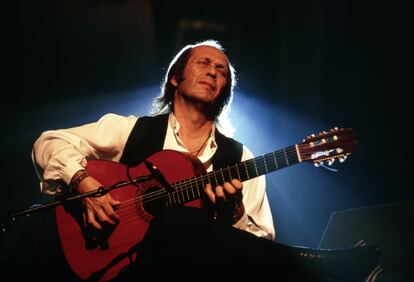The Madrid Court ratifies the sentence that recognized Paco de Lucía as the sole author of 'Entre dos aguas'


Paco de Lucía is the sole author of the song Entre dos aguas and 36 other musical works. On the tenth anniversary of the artist's death , this was ruled by Section 32 of the Provincial Court of Madrid this Tuesday. The court ratifies the resolution issued by the Commercial Court No. 3 of Madrid, which in April 2023 and after 14 years of litigation settled the claim filed by the guitarist's heirs against the producer José Torregrosa (who died in 2005), who appeared as co-author in the flamenco songs.
The court confirms in its writing that Torregrosa merely transcribed the works created by Paco de Lucía, a self-taught musician who lacked the training to do so, into sheet music, in addition to processing their registration in the repertoire of works composed in the sixties and seventies entrusted to the management of the SGAE. That he registered himself as co-author of the 1973 song on the album Fuente y caudal is described by the Court as “a breach of trust towards the true creator and author of the works”, who, as stated in the resolution, never dealt with this kind of management “until a younger member of his family, specifically his daughter, took care of it and uncovered a situation that has been brought to an end by this sentence”. Lucía Sánchez is a lawyer and daughter of Paco de Lucía, and has been key in this process: “It has been very complicated, because the intellectual property laws admit abundant nuances and are complex. Many people told me to give up, but I continued,” he said in 2023, after receiving the ruling from the commercial court.
The producer's heirs have maintained during the lawsuit that it was not a mere transcription, as it was accompanied by the making of multiple arrangements and modifications. The document confirms, however, that, taking into account the recordings and the judgment of specialists, in those specific cases in which the presence of some kind of musical arrangement could be detected, it lacked the necessary significance required to generate a derivative work. "Paco de Lucía's compositions are of such technical complexity (which include extremely difficult staccato and strumming) that they could only have been conceived by a guitarist, and also in a flamenco style," the resolution points out to justify the authorship of Paco de Lucía and not that of Torregrosa, who was a pianist and not a flamenco musician. His scores, they object, "were prepared from the position of a pianist, and although it is true that his curriculum includes the composition of a flamenco mass, it is a choral work." Among the 37 songs by Paco de Lucía are also included Canastera, De madrugá, Farolillo de feria or Farruca de Lucía.
The heirs of the producer were already forced in the first instance to return the amounts that had been received by virtue of the exploitation of these works for decades, as well as the moral damages. This judicial decision, which can be appealed before the Supreme Court, contemplates the payment of costs to the appellant, in addition to confirming the compensation of 10,000 euros for moral damages. The magistrates focus, in fact, specifically on the moral damage caused to Paco de Lucía. “We are faced with a world-famous artist, considered a master in his genre, who has been publicly denied the recognition of the exclusive authorship of a fairly significant number of his musical works. It is clear that the interested party expressed his bitter complaint for this reason and that he tried to fight against this situation during his lifetime without having time to achieve success in his endeavour. One can perfectly understand the affliction that the experience of a situation like this necessarily caused Paco de Lucía, when the artist sees himself powerless against the contumacy of the other party.”
EL PAÍS






